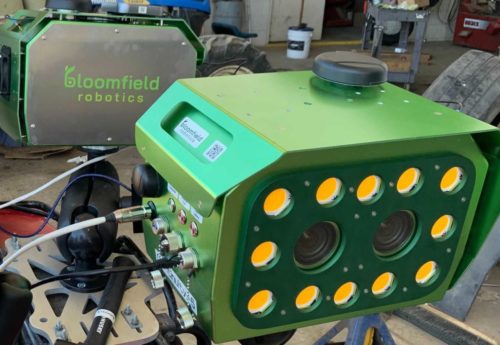In what could be a sign of Pittsburgh’s increasing prowess in the space, a local agtech startup just attracted millions in funding for its first round, including support from one of the world’s largest farm vehicle manufacturers.
Last week, Japanese farm equipment company Kubota announced an investment in South Side-based agricultural tech startup Bloomfield Robotics with the goal of leveraging the local firm’s image analysis and artificial intelligence technology to improve crop surveillance functions in Kubota’s tractors.
In addition to Kubota, other investors in Bloomfield Robotics included Pax Momentum and Thrive SVG, accelerators that included the startup in their recent cohorts. In total, the company raised $1.8 million for its first funding round.
While Bloomfield Robotics and Kubota have plans to work together in the future, Bloomfield CEO Mark DeSantis clarified that this is an equity investment and not the full announcement of its partnership with Kubota yet.
“They make all kinds of vehicles that are of interest to us because essentially what we’re doing is moving a camera around the field,” he told Technical.ly. “And then in doing that, we are imaging plants.”
Using its AI-driven FLASH camera, Bloomfield Robotics collects data on plant health and growth patterns, learning to detect issues to help farmers address crop problems more efficiently and effectively. The company is currently focused on applications of its technology in the specialty crops industry, where revenues are much more dependent on individual crop health, as opposed to the row crop industry, where damage to one plant is less detrimental to the farm’s income.
Having a combination of a NASA, a French vineyard in Bordeaux and a grape grower in South America is probably a more interesting combination of customers than any company would ever have.
Prior to this new collaboration, the startup would attach its cameras to the equipment already owned by the farms it’s working with on a case-by-case basis. This new approach will potentially allow the company to streamline that process by attaching to Kubota tractors and allow its technology to reach a much wider range of customers that already work with Kubota equipment, DeSantis said.
Right now, Bloomfield has 18 vineyards across three countries as customers, plus a blueberry grower in Peru. The new funding will allow Bloomfield Robotics to expand its customer base to new countries and specialty crops, as well as expand its blueberry monitoring operations after finding success with its first customer, DeSantis said. The money will also help to further sophisticate the camera, data storage and management and plant sciences behind the company’s technical operations.
Beyond these Earth-based customers, Bloomfield Robotics has a parallel collaboration with NASA in a project to take its crop cameras to space, supported by a $1 million grant. Once there, they’ll monitor the health of crops in the greenhouse at the International Space Station.
“Having a combination of a NASA, a French vineyard in Bordeaux and a grape grower in South America is probably a more interesting combination of customers than any company would ever have,” DeSantis said. To support those projects and more in the new year, the CEO mentioned that Bloomfield Robotics is actively hiring and looking to expand its team of 14 full-time employees.
Along with other local companies such as Fifth Season and Four Growers — plus the new Mimetic partnership between RustBuilt and KRNLS that convenes farmers and technologists — Bloomfield Robotics seems to be part of a growing trend of agtech in Pittsburgh. But DeSantis thinks it’s really part of an even larger trend in Pittsburgh: using the local robotics and artificial intelligence expertise in new applications across all industries. Now that those core industries are more established here in a number of tech companies, the city’s innovators are looking to new problems and new verticals that can benefit from robotics.
Indeed, DeSantis said that more than a trend, this might be the start of Pittsburgh’s future as an increasingly world-renowned tech hub.
“It might look like a trend,” he said. “But I draw back to the bigger picture and say, well, not so much. This trend is this just yet another application of AI to solve the big problems in the world. So definitely you’re going to see more agtech, but you’re going to see a lot more other businesses, too.”







